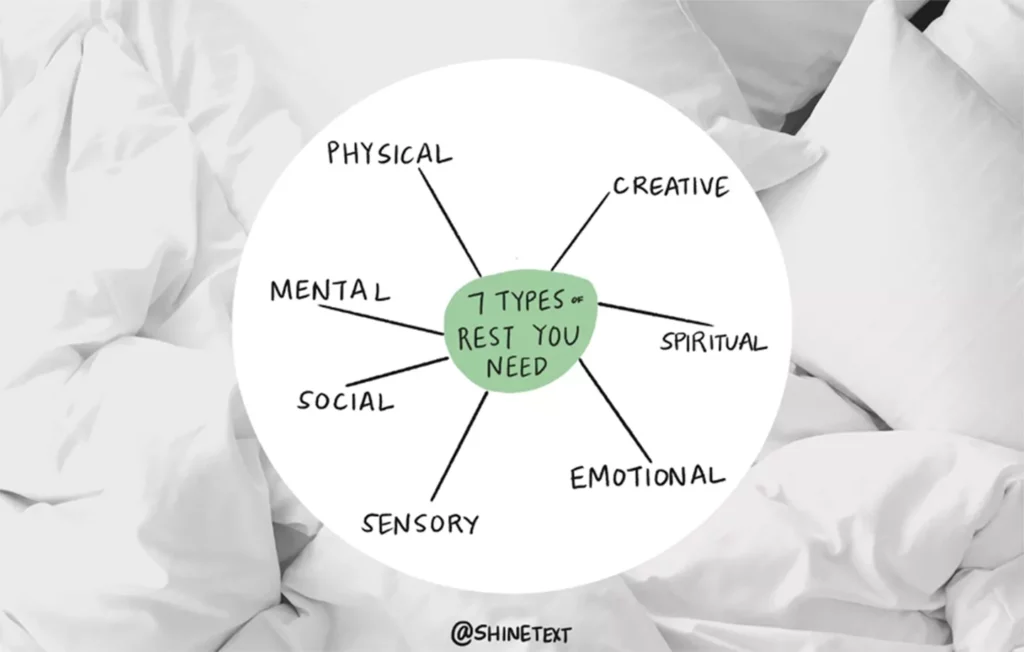
Live
7 Rest Shortcuts
Written by John Wright

Live
Written by John Wright
10 minutes
Quick: What’s your go-to form of rest?
I’ll start.
When I was feeling rundown, I would hit the gym. Then I would turn on the TV for an afternoon of football or a whole season of Yellowstone (if you haven’t binged on this yet, I highly recommend it, lol). I would then go to bed “early” on Saturday and Sunday nights. Well, normal is 9:00 p.m., so “early” is 8:00 p.m., or even 7:30. And, while that provided me with an extra hour of sleep, I wasn’t actually rested or restored. I knew I was missing something . . .
Turns out, I was missing six “somethings.”
Molly Shae @ ShineText outlines some great ideas and research on new ways of thinking about rest.

Shutting off your brain can provide some rest in certain situations, but it’s just one of the seven forms of rest that help us to function as humans.
According to physician Saundra Dalton-Smith, MD, author of Sacred Rest: Recover Your Life, Renew Your Energy, Renew Your Sanity, humans need physical, mental, social, creative, emotional, spiritual, and sensory rest. Watch her TED Talk here: https://youtu.be/ZGNN4EPJzGk.
“Most people, when they think about rest, they have a very one-sided approach—they lounge around, don’t do anything, and think that’s what rest is,” Dalton-Smith tells Shine. “We try it, and then when we’re still rest-deprived we think it doesn’t work.”
You’re likely in need of better rest, if you feel the way I have when leaving the gym. “People say, ‘I’m tired all the time, I’m drained,’” Dalton-Smith explains of her patients. “If they’re waking up (after sleeping) and still exhausted, the issue probably isn’t sleep. It’s likely a rest deficit. If you’re waking up (after sleeping) and still exhausted, the issue probably isn’t sleep. It’s likely a rest deficit.”
Getting the proper type of rest requires identifying what, exactly, you’re missing.
“For a lot of people, if you have a deficit in an area, you’re likely to experience specific symptoms,” Dalton-Smith says. “If your deficit is in mental rest, you might have trouble with concentration. If you have an emotional deficit, you may find you’re snapping at your spouse, and they haven’t done anything. If you have a sensory rest deficit, maybe you used to love 4th of July fireworks, but now you’re jumping out of your skin, or you’re chronically anxious when getting out of the car.”
Once you’ve figured out the type of rest you need, it’s time to adapt your rest to fit that specific need.
Our national form of rest at the moment is to cancel plans and turn on the TV—a move that Dalton-Smith says can actually result in more exhaustion than before, since most of us need a break from screens.
Instead, she suggests methods tailored to your particular deficit.
Here’s how to get the rest you deserve.
You’ll know if you’re physically exhausted: You’re struggling to keep your eyes open, and even walking to bed feels like moving through quicksand.
The most common form of physical rest is sleep, so consider hitting the hay thirty minutes earlier, or sitting out that HIIT class.
Catching up on physical rest can also mean taking deep breaths during the workday or squeezing in a restorative yoga class to give your body some time to stretch. More energy (and less yawning) should be a pretty obvious sign that it’s working.
Ever felt like your brain’s turned to mush? Then you know what it’s like to need mental rest.
You may realize you’ve been staring at the same page of a book for ten minutes, or just sent a barely comprehensible email. Perhaps you notice your thoughts starting to turn negative, judging everything you do (like, perchance, sending an awkward email).
The next time you need a mental break, turn off your screens and take a few moments to ground yourself. You might try adding a meditation to your day or simply repeating a calming mantra.
Socializing can be exhausting, but alternating draining encounters with restorative ones can help bring balance. “My biggest deficit is social rest,” Dalton-Smith says. “I’m an overachiever, I’m competitive, and I like to be moving toward goals—it becomes easy to be this solo warrior. So for me, [social rest] means finding people who are in my tribe—women I don’t have to compete with.”
For you, social rest might mean catching up with an old friend who knows the way you think and feel without any lengthy explanation. Or perhaps it’s just taking a night off from socializing via Zoom and FaceTime and reconnecting with yourself.
Chances are, you flex your creativity more than you think. Ever brainstorm solutions at work, or put together plans for a bachelorette party? You’re tapping into creative thinking—and putting yourself in need of creative rest.
Give yourself a break by going on a walk in nature or reading an engrossing book. Surrounding yourself with inspiration can help replenish your drained resources—and take the pressure to create off your mind.
Think of how you feel after a funeral or breakup or rewatching Titanic—hungry, exhausted, and confused all at once.
Get some emotional rest by offloading your feels to a willing listener, then keep talking to prevent future emotional overload. That could mean scheduling regular therapy sessions or finding people with whom you can be 100 percent yourself.
Feel afloat, unanchored, alone? You’re likely in need of some spiritual rest. That could mean practicing your religion if that’s your jam, but it could also mean seeking out a sense of purpose, something to ground you and provide a little context.
Volunteering in some way might help you find that spark, as could chatting with a friend about the current state of the world.
Sensory exhaustion is one of the most prevalent drainers thanks to the amount of screens, Dalton-Smith says. In her practice, she’s seen it cause “a lot of eye strain and neck tension, and a lot of divorces and broken relationships,” she says. “It becomes easier to talk to the computer. . . . That breaks intimacy, and overtime, it breaks relationships.”
Catch up on sensory rest by putting aside the technology and stepping outside for fresh air if you’re able to do so. Check in with yourself before reaching for the remote on nights “off”—is staring at a screen really the rest you need?
1. When was the last time you got the most amazing breakthru idea, motivation or inspiration after a time of rest?
2. Do you often increase your sleeping, workouts, drinking or prayer time and still not experience being refreshed or relaxed or inspired?
Have you ever tried to shoot free throws with your left hand? It takes immense focus, you have to be closer than normal, it feels weird and different, you want to go back to the “normal” way because it’s easier.
We get all the types of rest below by doing the opposite of what is normal for us. Oddly enough, you don’t feel rest-restoration right away with these rest methods. The replenishment often happens in your “peripheral” vision. You only know it happened when you get a surge of energy, a new idea or clarity later. Even part of this “retreat” feels un-productive. The productivity, the surge and the insight will come later. This is one reason why we don’t do these types of rest activities as leaders very often. Because the effect doesn’t seem immediate, and the cause/effect button feels less direct. So, we don’t practice or direct others to practice these activities. We like to know what’s working and what’s not…immediately!
I recently went away to the beach. I only read fiction, stories about romance, murder, and adventure. There was actually zero “productivity” in this type of reading for me and I don’t do it very often (like never). Somewhere along the way when I picked up one of my normal books about meditation and spirituality and being “in the moment”, I felt the immediate drag and weight of working on all those deeper things. I thought, “wow” that is not what I need right now even though it’s what I am used to. Here’s what I also tried: I never turned on the TV, I only looked at my email once…hey, I’m not perfect… and I did try to bring my mind back to the present moment when it started floating away toward future worries.
It is only now, a week later, that I am reaping the benefit of those rest breaks.
1. Mental: Close your eyes, turn off electronics. laugh
2. Spiritual: Pray (not a to-do or wish list) meditate, focus on the moment only and the next
3. Emotional: Let someone care for you instead of the other way around, this may include a therapist.
4. Social: If you talk a lot/be silent. If you are in your head thinking all the time force yourself to talk
5. Creative: Stop problem solving…seriously. Read fiction not self-help or leadership or religious/political media.
6. Physical: Do the opposite workout you normally do, walk backwards the forward then backwards (notice what your mind is doing)